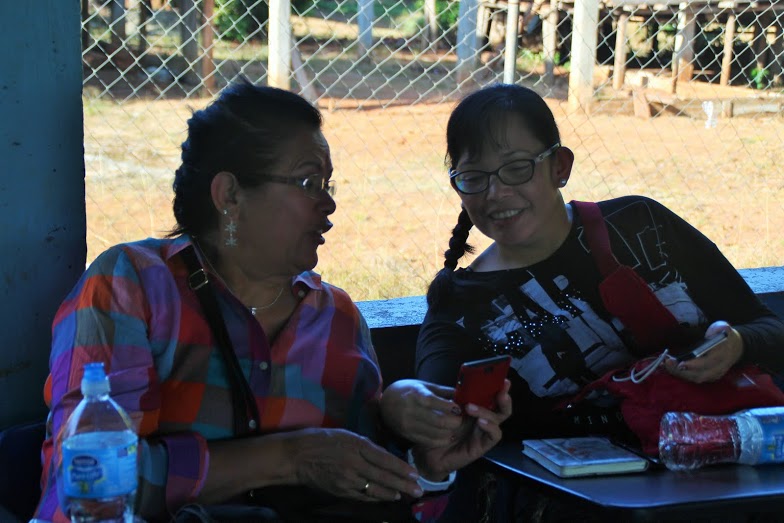One of the most distressing calls for justice around the world today comes from the Indigenous voice. Amplified by the indignities suffered through historic theft and displacement of their life and land, their marginalization today is a story told to many but heard by few. As the world changes so must they, but how they do so is neither obvious nor easy. It is a sign of hope, though, that a globalized world which heaps burdens on a nation’s Indigenous can also be that which offers the largest venue of support and solidarity for a group’s own self determination and cultural renewal. This is the hope of the Gospel, one that defies opposition and defines reality.
It was in this spirit that the delegation from the Mennonite World Conference (MWC) visited Panama on Feb. 15-24, 2015 to listen to the Wounaan tribe speak about their struggle for identity in a world that changes around them. Featuring representatives from Brazil, The Netherlands and Burkina Faso (who was unable to come due to a visa problem), and also with Secretary of the Peace Commission Jack Suderman and of course our very own Joji Pantoja, the delegation convened with the Iglesia Evangelio Unida Hermanos Menonitas (IEU) and together spent time with the Wounaan people in order to enhance both the worldwide and national Mennonite church’s relationship with them. With the hope of strengthening the Wounaan’s own capacity to assert their rights and revive their culture, as well as lending support through international pressure, advocacy, and prayer, the aim is to walk with the Wounaan and struggle with them so that they may live a life of dignity, free from the paralysis of repression. This journey starts with understanding, with listening to the hopes, fears, and losses of the people and contextualizing them in a larger political, global, and ultimately spiritual reality.
What the delegation heard may not be surprising to those familiar with Indigenous rights issues around the world, as PBCI and MWC surely are. Familiarity, however, does not always ease the consciousness of pain, especially when it looks you in the eyes. Stories of displacement, dejection, and death; of mutual distrust and reciprocal violence with the government, the settlers, and resource extraction corporations; of a loss of culture, identity, and voice; and endless examples of the concomitant self-destruction that follows such external pressure, like alcoholism, abuse, and fragmented communities. This and more is what weighs on the 15,000 strong Wounaan people.
And yet there is light, a light that the IEU and MWC delegation see in the nonviolent resistance waged by the Wounaan. Street gatherings in the capital, dialogue with the government, legal and administrative battles, and coalitions with the six other tribes in the country have been highlights in a generation of struggle. The will to resist both oppression and wide scale violence have been admirable, but beyond token responses and half-measures by authorities, little progress has been made. This is the point where hope becomes most difficult and yet ever more critical. It is seen in young Wounaan students of law seeking to defend their rights, in leaders recognizing the need for peace education and training in reconciliation, and in the formation of action plans and networking to broaden the pursuit of change. Here is where the role of the church can be catalyzing in achieving justice, with many avenues of support to explore.
And there is no shortage of example to draw from in the realm of Indigenous rights assertion. Indeed, what you are reading is relevant to PBCI not only because of Joji Pantoja’s participation in the MWC delegation, but because what the Wounaan are experiencing is a Central American parallel to Indigenous People’s modern narratives here in Mindanao. From profit driven policies which devastate the land to crumbling tribal identities, PBCI’s partnerships with certain IP tribes have exposed us to the broken power relations which ignore international law and benefit tributaries to a corrupt system at the expense of the restive masses. And yet though they remain the most vulnerable victims, IP’s also have a capacity for restoration and cultural regeneration unique as their own timeless histories.
We see this in examples like the Talaandig, who are a model among Bukidnon tribes in carving out a livelihood suitable to their own beliefs and values. Organizations like iEmergence and programs like Canada’s recent Truth and Reconciliation Commission are crucial in affirming the steps that can be taken as well as the long road to go in the pursuit of justice and equality. With Indigenous rights enshrined in the 2007 United Nations Declaration on the Rights of Indigenous People (UNDRIP), it is easy to see how so many nations fall short of these goals. However, the mere fact that there are now legal standards given official acknowledgment under the (admittedly shaky) authority of the international community is very important. It is a step forward, a marked change from 30, 50, 100 years ago. And when we look at justice through a historical lens, Martin Luther King Jr’s quote injects a fresh perspective toward which we might orient ourselves, “the arc of the moral universe is long, but it bends towards justice”. To that end we might devote whatever energy we find within us to share; why not begin with prayer, in light of the hope the MWC delegation saw in the Wounaan, namely “a profound sense that the truth will eventually win out, but that it needs to be exposed”. God Willing.























